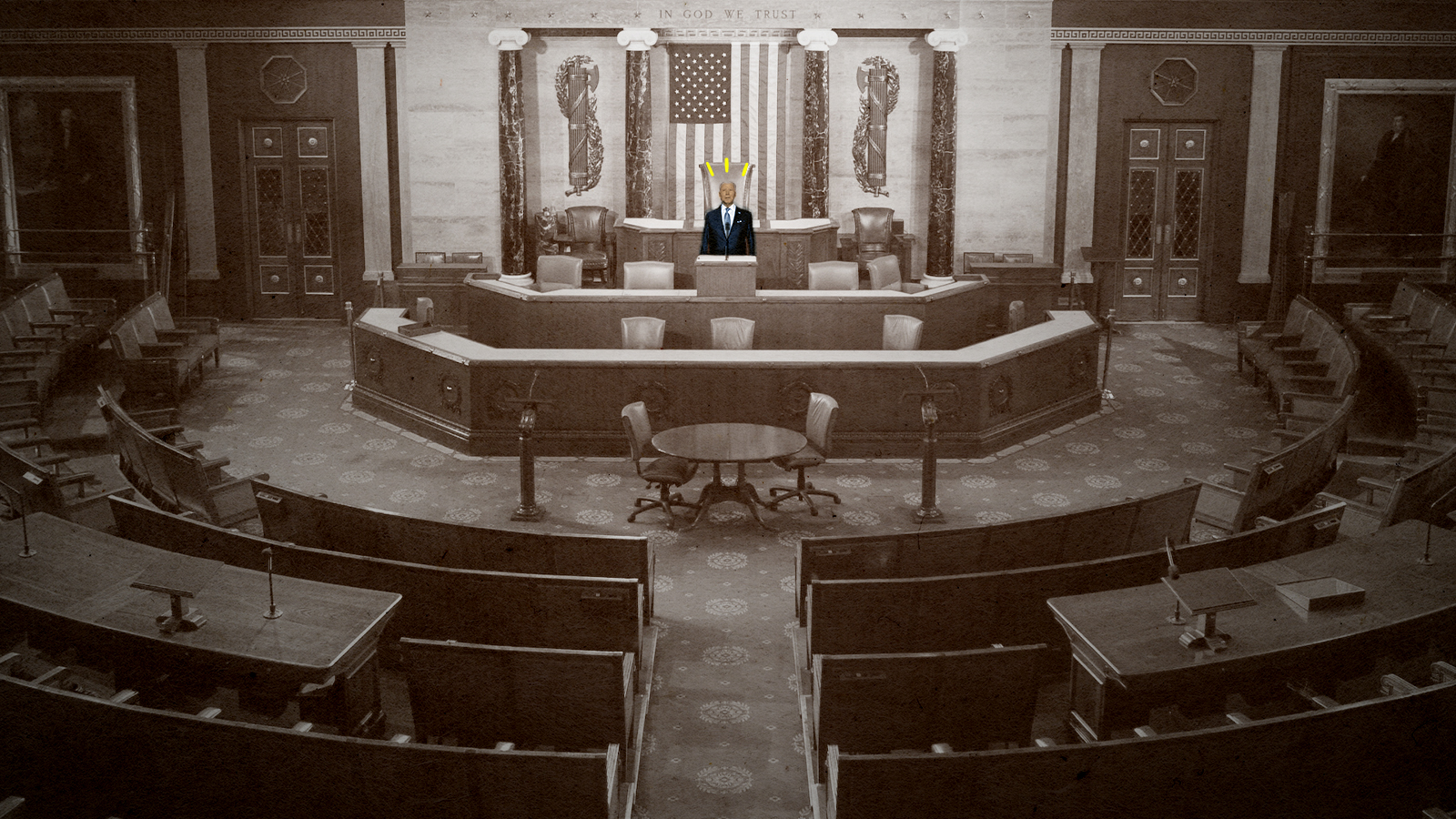COVID is the perfect excuse to finally axe the State of the Union


A free daily email with the biggest news stories of the day – and the best features from TheWeek.com
You are now subscribed
Your newsletter sign-up was successful
They're doing it again. According to news reports, the Democratic leadership in the House of Representatives plans to sharply cap attendance at the State of Union address. The speech has already been postponed to March 1, its latest date in history. Now President Biden will appear before an underpopulated, socially distanced chamber for the second year in a row.
Continuing health restrictions and delays raise the question of whether the ritual should continue at all. Although it's become a fixture of the political calendar, giving a major public address is not among the president's formal responsibilities. Instead, the Constitution requires only that the president "shall from time to time give to the Congress Information of the State of the Union, and recommend to their Consideration such measures as he shall judge necessary and expedient." From Thomas Jefferson's administration until 1913, presidents discharged this duty in the form of a written annual message.
The author of the change, as with many degradations of American politics, was Woodrow Wilson. Convinced that the presidency was the only truly national office, Wilson decided to revive the pre-Jeffersonian practice of presidents appearing in person before Congress.
The Week
Escape your echo chamber. Get the facts behind the news, plus analysis from multiple perspectives.

Sign up for The Week's Free Newsletters
From our morning news briefing to a weekly Good News Newsletter, get the best of The Week delivered directly to your inbox.
From our morning news briefing to a weekly Good News Newsletter, get the best of The Week delivered directly to your inbox.
Initially an attempt to rally the legislature around a coherent agenda, in the manner of British prime ministers, the speech soon became an opportunity for presidents to reach the general public using broadcast media. In 1923, Calvin Coolidge delivered the first State of the Union address to be carried on radio. In 1947, Harry Truman's speech appeared on television.
Presidents' increasing access to the airwaves made the ritual less necessary, though. Presidents have ample chances to announce and defend their policies through live press conferences, staged speeches, and now, social media. Stripped of the distinctive function Wilson imagined, the State of the Union has degenerated into a spectacle of almost monarchical deference. It doesn't help that few modern presidents have any talent for oratory. Trained to deliver soundbites, they tend to stumble blandly through rhetorical set-pieces that are forgotten as soon as they are uttered.
We don't have to do it this way. Pandemic conditions provide a perfect opportunity to cancel the ceremony and revive its less pompous predecessor. Presidents are not monarchs addressing subjects. They are elected officers of the Constitution, charged to give an account of national conditions and offer suggestions for improving them.
A written message was good enough for Jefferson, Abraham Lincoln, and Theodore Roosevelt. It's good enough for Joe Biden, too.
A free daily email with the biggest news stories of the day – and the best features from TheWeek.com
Samuel Goldman is a national correspondent at TheWeek.com. He is also an associate professor of political science at George Washington University, where he is executive director of the John L. Loeb, Jr. Institute for Religious Freedom and director of the Politics & Values Program. He received his Ph.D. from Harvard and was a postdoctoral fellow in Religion, Ethics, & Politics at Princeton University. His books include God's Country: Christian Zionism in America (University of Pennsylvania Press, 2018) and After Nationalism (University of Pennsylvania Press, 2021). In addition to academic research, Goldman's writing has appeared in The New York Times, The Wall Street Journal, and many other publications.
-
 6 of the world’s most accessible destinations
6 of the world’s most accessible destinationsThe Week Recommends Experience all of Berlin, Singapore and Sydney
-
 How the FCC’s ‘equal time’ rule works
How the FCC’s ‘equal time’ rule worksIn the Spotlight The law is at the heart of the Colbert-CBS conflict
-
 What is the endgame in the DHS shutdown?
What is the endgame in the DHS shutdown?Today’s Big Question Democrats want to rein in ICE’s immigration crackdown
-
 Epstein files topple law CEO, roil UK government
Epstein files topple law CEO, roil UK governmentSpeed Read Peter Mandelson, Britain’s former ambassador to the US, is caught up in the scandal
-
 Iran and US prepare to meet after skirmishes
Iran and US prepare to meet after skirmishesSpeed Read The incident comes amid heightened tensions in the Middle East
-
 Israel retrieves final hostage’s body from Gaza
Israel retrieves final hostage’s body from GazaSpeed Read The 24-year-old police officer was killed during the initial Hamas attack
-
 China’s Xi targets top general in growing purge
China’s Xi targets top general in growing purgeSpeed Read Zhang Youxia is being investigated over ‘grave violations’ of the law
-
 Panama and Canada are negotiating over a crucial copper mine
Panama and Canada are negotiating over a crucial copper mineIn the Spotlight Panama is set to make a final decision on the mine this summer
-
 Why Greenland’s natural resources are nearly impossible to mine
Why Greenland’s natural resources are nearly impossible to mineThe Explainer The country’s natural landscape makes the task extremely difficult
-
 Iran cuts internet as protests escalate
Iran cuts internet as protests escalateSpeed Reada Government buildings across the country have been set on fire
-
 US nabs ‘shadow’ tanker claimed by Russia
US nabs ‘shadow’ tanker claimed by RussiaSpeed Read The ship was one of two vessels seized by the US military
